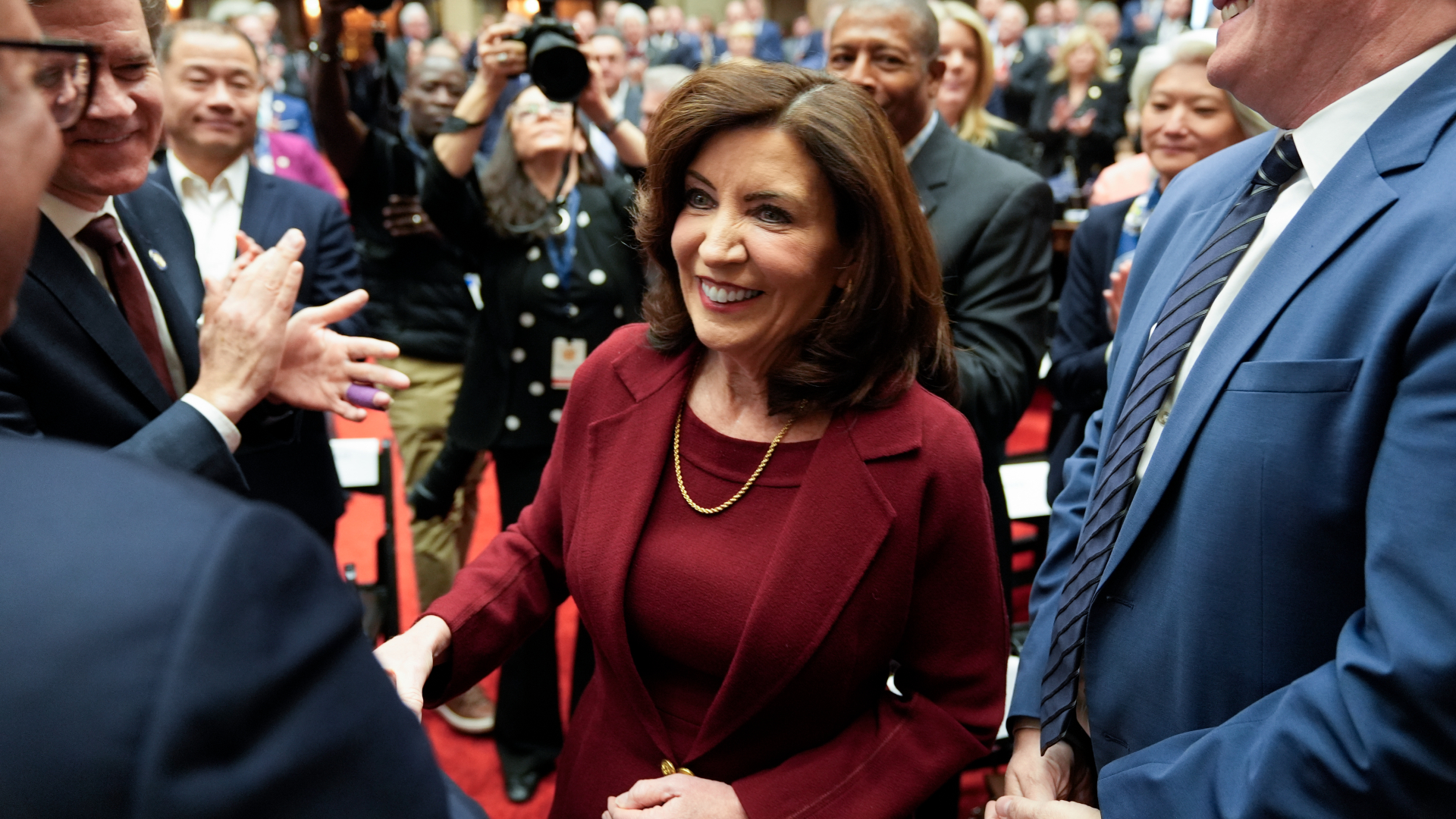As crucial House elections near, New York governor outlines agenda

New York Gov. Kathy Hochul greets people as she arrives to deliver her State of the State address in Albany, N.Y., Tuesday, Jan. 9, 2024. (AP Photo / Seth Wenig)
ALBANY, N.Y. (AP) — New York Gov. Kathy Hochul outlined her agenda for 2024 in a State of the State address on Tuesday, with the Democrat focusing on housing, public safety and education policies ahead of a pivotal election season in a state whose races could determine control of Congress.
The annual address in Albany came as both Republicans and Democrats have placed increased attention on New York as a potential battleground state for the U.S. House in November, adding a level of national importance to the governor’s agenda this year.
For Hochul, the dynamic could prove challenging as she moves to compromise with progressive statehouse Democrats while not exposing her party’s congressional candidates to attacks from conservatives.
One of the biggest priorities for the governor this year is to reach a deal with progressives to create more housing in the state, a politically vexing problem that has previously proven elusive but remains a tenant of her agenda.
The governor last year pushed hard on a housing plan that eventually failed after it was panned in the city’s suburbs for provisions that would have set growth targets and sometimes let the state override local zoning decisions. This year, with the suburbs emerging as must-win areas for congressional Democrats, Hochul is taking a different tack.
She is proposing a $500 million fund to support the construction of housing on state-owned land and wants to reestablish a program that previously gave developers tax breaks if they agreed to create so-called affordable housing in buildings in New York City.
In addition, Hochul is pushing for certain state funding programs to require that local governments prioritize housing growth. The governor’s plans also include a tax break for developers who turn office buildings into residential units if they agree to include below-market rate housing.
“The only thing that would solve this problem is building hundreds and hundreds of thousands of homes,” she said of the state’s notoriously high rental costs.
State Senate Majority Leader Andrea Stewart-Cousins has told reporters that Senate Democrats were pushing for a housing agreement that focuses on tenant protections. In the past, those have included measures to prevent landlords from evicting residents without a so-called good cause, such as failure to pay rent.
Hochul is also moving to get ahead of Republican criticisms about crime that hurt Democrats during the 2022 congressional elections.
She is proposing a law enforcement task force on retail theft and the creation of a state police team focused on organized retail theft rings, along with more state funding for such programs. The governor said she plans to establish a tax credit for small business owners to help offset the cost of certain store security measures, and will propose legislation to increase criminal penalties for assaulting a retail worker.
“These attacks are nothing more than a breakdown of the social order. I say no more. The chaos must end,” Hochul said of retail theft.
Also part of her public safety platform was an expansion of mental health care services in New York, with proposals to add 200 new inpatient psychiatric beds and better equip law enforcement to handle people with mental health problems. The governor would also establish a state team that would help people in the criminal justice system connect with mental health services.
Hochul has spent the past week debuting other pillars of her agenda, calling for an overhaul of literacy education and paid medical leave during pregnancy, among other things.
In her speech, the governor notably chose not to address how the state would continue to handle a large influx of migrants who have mostly landed in New York City, straining the city’s homeless shelters and financial resources. She said she would expand on her plans next week during a budget proposal. The state has already allocated $1.9 billion in emergency spending related to the surge of migrants, and Hochul has previously committed another round of financial assistance to the city.
This year’s legislative session will include a contentious congressional redistricting process that could impact which party controls the House.
A bipartisan redistricting commission will submit a proposed map to lawmakers at the end of February which can then be accepted or altered by Democrats who control the Legislature. Democrats are widely expected to try to give their party an advantage in crucial districts ahead of the fall elections.
Democrats have dedicated major financial and campaign resources toward their goal of retaking a handful of congressional districts in New York in November. Republicans are aiming to hold onto the seats.
The first bellwether could come soon: A special election of a successor to George Santos, the New York Republican who was expelled from the House, will be held Feb. 13.